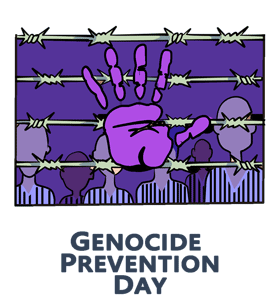Genocide Prevention Day
Genocide Prevention Day Quick Facts in NZ
| AKA Name | "International Day of Commemoration and Dignity of the Victims of the Crime of Genocide and of the Prevention of this Crime" |
|---|---|
| HashtagsCompiled on | #GenocidePreventionDay, #TigrayGenocide |
| Related Hashtags | #Genocide, #InternationalConferenceonGenocidePrevention, #Tigray, #Gaza, #EndGBV |
| 2024 Date | 9 December 2024 |
| 2025 Date | 9 December 2025 |
2024 Holidays & Dates - NZ
| New Zealand & Common Holidays | ||
| Misc. & Int'l. Observances | ||
| Christian Holidays |
› | ||
